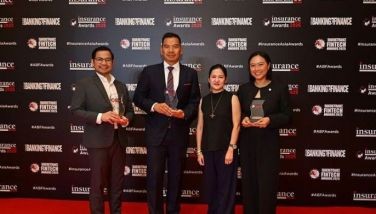France, Germany and Poland stand with Ukraine
Two years after Russia started its brutal war against Ukraine, the Foreign Ministers of the Weimar Triangle make an ironclad commitment to the independence of Ukraine.
Ten days ago, a pivotal meeting convened near Paris, uniting the foreign affairs ministers of France, Germany and Poland to reaffirm common determination to give a new energy to the trilateral cooperation. This setting, known as the “Weimar Triangle” originated in 1991 amidst the dissolution of the Soviet Union. Its primary purpose was to foster German-Polish reconciliation, following the French-German model. Europe is fully herself when breathing with two lungs – the Eastern and the Western.
Why does it matter today here in Manila, 10,000 kilometers away from European capitals?
Since Feb. 24, 2022, Europe is confronted with Russia’s full-scale war against a sovereign member of the international community. Russia’s unprovoked and unjustified military aggression against Ukraine is a flagrant violation of the prohibition of the use of force under the United Nations Charter. Russia has broken one of the most fundamental principles of international law by directly threatening the security and stability in Europe and in the world. This brutal war not only challenges the international order but has also brought unprecedented suffering to Ukrainians, killed thousands of innocent citizens, and also destroyed infrastructure and disrupted global food and energy markets. That is why Russia continues to be a threat to global security.
The war includes a complex hybrid warfare, masterminded by Russia. This warfare, characterized by lies and disinformation, cyberattacks and political interferences, seeks to destabilize our democratic institutions and undermine the very fabric of our societies and our ability to live in peace. As we approach the end of the second year of Russia’s illegal and unprovoked invasion of Ukraine on Feb. 24, the Weimar Triangle meeting served as a platform to reaffirm our shared values. Here, we pledged unwavering support for Ukraine’s sovereignty, territorial integrity and independence. Russia’s continued aggression and crimes in Ukraine demand for accountability. Russia should bear the legal, financial and economic consequences of its actions: no impunity to those responsible for war crimes.
Our commitment to supporting Ukraine is steadfast and encompasses the recent announcement of a 50-billion-euro Ukraine Facility financial package, designed to provide substantial and enduring military assistance. Moreover, we are united in supporting Ukraine’s journey towards EU membership. Ukraine’s future is in NATO. The forthcoming “Weimar + Ukraine” meeting will further solidify our ironclad commitment by including Ukraine as a policy dialogue partner. Supporting Ukraine is investing in international security – and promoting an international order based on the rule of law and the principles of the UN Charter.
The repercussions of Russia’s illegal and unprovoked invasion of Ukraine resonate globally, disproportionately impacting vulnerable nations, including the Philippines. The Russian military’s intentional destruction and seizure of vast quantities of Ukrainian agricultural exports exacerbate food security challenges worldwide. Additionally, Russia’s actions have fueled inflation and disrupted global supply chains and energy markets, affecting the daily lives of people everywhere. By undermining global stability and the peaceful resolution of international disputes, Russia’s conduct threatens to embolden other nations to resolve conflicts through force rather than peaceful means and diplomacy. This situation holds profound significance for the Philippines, just as it does for Europe. EU and the Philippines are interconnected to build and support the principles of global order, worldwide.
For Russia, “negotiating peace” implies the acceptance of imposed “new territorial realities,” a narrative we must recognize as deceptive. Since the invasion, Russia has experienced substantial military and political setbacks, which have eroded its long-term human and industrial potential. Remarkably, Finland has joined NATO, Sweden is about to join – a previously inconceivable development. Ukraine, Moldova and Georgia have achieved EU candidate status, and Russia’s neighbors are increasingly distancing themselves from Moscow. The resilience and courage of the Ukrainian people have inspired Europeans, fostering unprecedented unity. Despite facing military threats, Ukraine established a maritime corridor in the Black Sea to ensure the continued export of grain, demonstrating its commitment to global food security. Kyiv deserves our full support.
In response to Russia’s aggression, the Philippines expressed unprecedented solidarity with Ukraine; in this respect, the positions of Manila and European capitals were very similar. Europe is responding to escalating security challenges by adapting its strategic posture. And so does the Philippines. Our nations strive for independent foreign policies and strategic autonomy, grounded in partnerships with like-minded allies. We reject foreign intrusions in our democratic systems, and we are partners in defending the international rules-based order. We share humanitarian values and recognize our collective responsibility to support those in crisis, like displaced populations or refugees. The war crimes committed by Russia in Ukraine, including the state-sponsored deportation of nearly 20,000 Ukrainian children, destruction of secular and sacred culture, from archeological monuments to modern libraries, remind us that our values cannot prevail without a clear, united call against impunity.
The European Union was forged from the ruins of world war. The pursuit of lasting peace has always been the cornerstone of our European institutions. Confronting those who challenge our collective aspiration for peace is imperative to safeguarding a future where we can collectively work towards a better future, by focusing on crucial issues such as development and climate change. Currently, the illegal and unprovoked aggression on Ukraine launched by Russia stands as an obstacle in this path.
We stand with Ukraine. Slava Ukraini!
* * *
Marie Fontanel is the Ambassador of France; Andreas Pfaffernoschke is the Ambassador of Germany and Jaroslaw Szczepankiewicz is chargé d’affaires of the embassy of Poland.
- Latest
- Trending
























